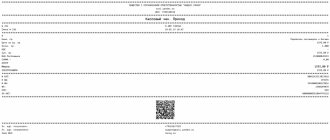According to the Federal Tax Service of Russia, the budget consists of 76% of taxes, while economic growth over the past five years was 2.4%, and tax revenues were more than 38%. This significant increase is mainly due to on-site tax audits.
To avoid audits, it is important for entrepreneurs to know what sources of information the fiscal authorities use. Now the tax office tracks a variety of information about a business; inspectors analyze literally everything, including:
actions performed with property;
all information about divorce proceedings, because Many operations are being carried out to split up the business using marriage contracts and fictitious divorce proceedings;
social media;
publications in the media;
advertisements on HeadHunter.
The decision to check may be influenced, for example, by correlating the vacancies posted by the company and the salary in them with information from official 2-NDFL certificates, in order to identify the company’s cash needs.
It is important to remember that the information of the company’s partners is also checked; it can show whether and what sources the object of verification has for obtaining cash resources. These can be either one-day companies or partners - individual entrepreneurs who provide marketing services, provide accounting services, etc.
As a result of analyzing all this information, the tax office makes a conclusion about the need to conduct an on-site audit.
Why preparation is important
If the tax office comes for an on-site audit, she already knows what and where to look.
Selection methods have long been known to everyone. How to understand that the situation is escalating, and your business is being developed by the tax authorities, I will prepare a separate article.
So, the tax office has already carried out a comprehensive analysis of your activities, identified problematic issues, and even calculated a forecast amount, for which an on-site tax audit is coming to you. And the inspector’s task is to go to the place, look around and collect evidence that you are breaking the law.
But! If the verification comes, it means nothing has been proven yet. Inspectors go to collect evidence using the weak links of any business - employees and documents.
Your task is to survive this test with minimal losses.
Don’t give away too much and know what evidence was collected and in what ways. Be careful and very attentive!
To prove the correctness of your actions in court or at the pre-trial stage.
Convincing and fearless.
There will be no special warning
The tax office is not required to warn you that an audit is planned against the company.
In practice, the Federal Tax Service Inspectorate warns by telephone and calls the head of the Federal Tax Service Inspectorate to hand over the decision to conduct an inspection. Or uses a quick and cheap method of informing via TKS - through the taxpayer’s personal account.
The decision is considered received the next day from the day it is posted in your personal account. But the audit period begins to count precisely from the date the tax office makes its decision, and not from the date you receive it.
But sometimes an inspector can come suddenly, out of the blue. Present your official ID, hand over the decision and familiarize yourself with it.
It is important that with the decision to conduct an inspection, the inspector presents a request for the submission of documents, which you must comply with within 10 days.
If a very large volume of documents is requested, you have the right, the next day after receiving the request, to apply in writing to the head of the tax office for an extension of the deadline, indicating the reasons and the realistically possible deadline for submitting the documents.
Within 2 days, the head of the Federal Tax Service has the right to decide whether to extend the deadline or not. Right. But you don't have to. Depends on the weight of the reasons and your persuasiveness.
But don't be upset if they refuse. We already have 10 days!
And we are urgently working on preparing for the inspection!
Tax audit schedule for 2021
At the same time, the Federal Tax Service is not obliged to formulate public plans for tax audits. Moreover, the department's internal regulations require employees to treat the relevant plans as confidential documents not subject to disclosure. Actually, not even all employees of the Federal Tax Service have access to such information (letter of the Federal Tax Service of the Russian Federation dated April 4, 2008 No. ШТ-6-2/255).
The procedure for access of any persons to confidential information is regulated by the provisions of the Order of the Ministry of Taxes of the Russian Federation dated 03.03.2003 No. BG-3-28/96. It provides that the basis for providing information contained in tax audit plans of the Federal Tax Service must be the provisions of federal legislation. In particular, those that give certain persons special powers in terms of gaining access to information in the registers of the Federal Tax Service - for example, law enforcement agencies can receive privileges in this regard.
Some “liberalization” of the rules establishing a ban on disclosing the content of tax audit plans may be applied to the institution of plenipotentiary representation of the President of the Russian Federation. For example, in 2008, employees of the staff of embassies had the right, in a number of cases, to request information from the Federal Tax Service on the total number of inspections and individual entrepreneurs (Federal Tax Service letter No. ШТ-6-2/255).
It may be noted that the provisions of the Order of the Federal Tax Service of Russia dated May 30, 2007 No. MM-3-06/333 approved the conceptual principles of planning tax audits, as well as the criteria for the payer to independently assess the likelihood of an on-site visit by the Federal Tax Service. Despite the age of this legal act, its provisions are also applicable to the analysis of the situation with tax audits of organizations in 2020.
True, this normative act, like other sources of law adopted at the federal level, does not provide any unambiguous guidelines for the timing of relevant inspections. However, it will be useful to study in more detail the key provisions of Order No. MM-3-06/333 in terms of assessing the likelihood of a tax audit by the payer - we will do this a little later.
It is noteworthy that the objects of both on-site and desk tax audits can be any category of taxpayers.
Getting ready for inspection
Reality is the main thing
Even if the Federal Tax Service recognizes your counterparty as a “fly-by-night”, you must prove that the transaction with this counterparty was real! It is very important!
It is worth thinking through and memorizing all the details of the legend with all employees involved in the transaction:
- how they found the supplier, who found him, why him, how the terms were discussed, where the contract was concluded, what the director looks like if they met in person, etc.
- delivery of goods: how they were delivered, what kind of transport, who owns it, what driver, who accepted the goods, who handed them over, etc.
- unloading to the warehouse: where is the warehouse, owned/rented, storage conditions, sufficiency of warehouse space, how it was unloaded, by what force, who received it, etc.
Pay attention to the logic of actions, time intervals, deadlines and dates indicated in the documents. The lack of “common” sense of the deal, discrepancies in dates and unrealistic deadlines are often “scorched” on this.
Keep all documents related to correspondence with counterparties. Save emails too. But be careful. Prepare fragments and scans. So that there is no unnecessary information for inspectors.
Even if the tax authorities have identified certain signs of a “fly-by-night” in relation to your counterparty, your convincing position can change the course of the case. Your diligence and non-involvement in illegal actions can be confirmed by documents and clear answers to questions during interrogation as a witness. This applies to all your employees. This is what my article “For interrogation? - No problem!"
Notify your counterparties about the inspection and compare the documents again
Especially constant, with high speeds, or suspicious, in your opinion. Find out if they have had any checks. Any. Desk, visiting, counter. Were there interrogations? Did they ask about you? What questions were asked, what answers were given. Think over the legend taking into account the information received. It is possible that they will come to them too.
The first and second copies of your documents with your counterparties must be absolutely identical. All details must match, including signatures, seals, numbering, and dates. Check again. Replace fax copies with originals.
Prepare explanations for the location of your objects
Where are the office, warehouse, branches, separate divisions, production facilities located? Rights of use, purpose of use. So that when leaving the site, the inspector can easily find it. There should be no extraneous property, documents or uninformed people there.
What activities can be carried out during the inspection?
Tax authorities have the right to carry out the following procedures:
- inventory - necessary to verify the accuracy of the data contained in the documents;
- inspection - during the inspection, production, warehouse, retail and other premises and territories can be inspected;
- request for documents - the official who conducts the inspection may require additional documents;
- seizure of documents - necessary to identify and confirm evidence of violations of tax laws;
- expertise - the tax authority can involve an expert in necessary cases;
- interrogation - they can interrogate witnesses to clarify circumstances that are important;
- calling as witnesses - tax authorities can call any individual who has the necessary knowledge to clarify the circumstances;
- obtaining an expert opinion;
- hiring a translator.
Where to get checked
Of course, like any audit, an inspection by the Federal Tax Service slows down the company’s work. Therefore, think about where it is better to survive it: in the office or bring documents to the inspection.
In my opinion, it’s better to go to the inspection: the inspector will not surprise you with the suddenness of his questions: there will be time to prepare documents for requests, not answer questions without preparation, transfer all communication to paper: demand - response with documents attached, another demand - another response with attachment of documents.
Submit the required documents, but slowly and very carefully. Please remember that the review period is limited.
During the audit, some of my partners brought volumes of documents to the tax office that did not raise any questions, but loaded the inspector’s office: loan agreements, acts of transfer of bills, bank statements. My head is spinning, there are mountains of papers, but no evidence of violations has been found.
The purpose of an on-site inspection is that the inspector comes to you. But you can contact the head of the tax office with a request to conduct it at the inspectorate due to the lack of possibility of conducting an audit in the office. The main thing is to motivate your request well. The arguments must be substantial, since your request may be rejected.
You can start renovations in the premises, refer to the quarantine of workers, or create crowded conditions - move everyone into one room. The inspector has the right to verify on site that this is not possible and come for an inspection. He also does not want inconvenience and, perhaps, he will justify to his management the advisability of conducting an inspection at his workplace in the inspection.
But if they don’t agree with you, don’t be upset either! Host inspectors at your place.
How often are desk audits carried out?
How to change the tax system for individual entrepreneurs and how often can this be done?
Desk audits of individual entrepreneurs consist of monitoring submitted tax returns. The Law on Inspections of Legal Entities and Individual Entrepreneurs establishes that the tax authorities are allocated two months for this. This period begins to last from the moment the reports are submitted to the tax authorities. Desk audits comprise the bulk of the work of all tax employees. How often the tax office checks individual entrepreneurs on the simplified tax system, patent or UTII is directly affected by the frequency of filing tax returns. In general, this happens four times a year.
Office preparation
Organize desks and safes
Take to your home other people's seals and stamps, flash drives, plastic cards, letterheads of other enterprises, including those already liquidated, and other incriminating items. Do not give the inspector a reason for unnecessary questions, unnecessary thoughts and additional research.
Take care of backups
Just in case. Inspectors use computer seizures in rare, acute cases. This may result in irreparable loss of valuable information. Therefore, it is better to transfer important work data to a remote server in advance.
Prepare your computer for the inspector
Delete all information in it except the accounting database for the audit period.
It is worth cleaning up the computers and other employees - removing unnecessary databases and dubious correspondence.
Be prepared to print tax registers or transcripts if required by the inspector.
You can also submit the requested information electronically.
Never place an inspector at your computer, do not enter your login and password, and exclude the slightest opportunity to “surf” your personal virtual world.
Prepare the inspector's workplace
Not exactly in the accounting department, where an emotional sales manager or a noisy driver can accidentally fly in. It's good if it's a separate room. Or a meeting room.
Prepare tea, coffee, sweets. Think about where and with whom the inspector will go for lunch. Offer a ride home after the end of the working day. There is no need to create an atmosphere of alienation. Attention and a kind joke will help defuse revision tension and constraint.
This may also be useful. It may happen that you invite an inspector fired from the tax office after an unsuccessful inspection to work as a tax consultant. Why escalate the situation in advance? You are confident in yourself. Be patient and endure the test with dignity. You don't need negativity. And a positive-minded inspector is capable of much. Exactly.
How to protect yourself from sudden visits from the tax office
First of all, you need to conduct your business as transparently as possible. This requires either a skilled accountant or a current account with online accounting functionality. Now almost any bank provides this function for an additional fee. With it, you will not be afraid of a tax audit. Any non-transparent transactions on an account are suspicious, and the main reaction of banks to suspicious transactions is blocking. Some banks even display an “account blocking danger rating” in the app, which allows you to understand whether you are conducting business transparently enough. When the rating starts to fall, you can simply call the bank and find out what the reason is. Modulbank has such a rating, so we recommend opening a current account there if you are afraid of being blocked.
Open an account
In addition, we recommend opening several current accounts at once in order to quickly transfer money from one to another if one of them is blocked. It is most convenient to choose banks with free account maintenance so as not to pay monthly fees. You can compare banks by clicking the button below.
List of profitable banks for opening an account
View list
Staff briefing
All questions only through the coordinator
Designate your representative to interact with the inspector. This could be a tax lawyer, chief accountant or financial director. Understands the rules of conducting an audit and knows all the risks of the business. It is this person responsible for the inspection who will respond to requests for the production of documents, transfer them to the inspector, listen to questions and provide answers.
All additional actions of the inspector (inspections, seizures, inventories, interrogations) must also take place under his strict control.
Conduct training for the entire team
React to requests, persuasion, instructions of the inspector - only in one way - send to the coordinator. No answers without his consent. No amateur performances. This is right.
All employees without exception must immediately report any requests from the inspector, oral or written, for example, the delivery of a notice of summons for questioning, to the person responsible for the inspection.
Set yourself and your team on the right tone
Getting in the mood is very important. Consider communication with inspectors as a type of business negotiation.
There's no point in starting a little war with the inspector. But intimate conversations with inspectors in smoking rooms should also be excluded. This is one way of collecting information.
Consider allowing employees to temporarily work from home. Especially unreliable, fussy and talkative ones.
Any support is important
It is very useful to invite an auditor, or a tax consultant, or a lawyer. For legal, methodological and moral support. Such professional assistance is provided by various consulting firms. It is advisable, of course, to take care of this in advance and have it already verified. Among them there are many theorists who reason and verbally solve any problems, but in reality “haven’t smelled gunpowder”, and shrug their shoulders in the case of truly dangerous situations.
You should always remember about tax risks. It is worth preparing for this issue in advance. And some transactions from a security point of view, in a quiet operation mode, should be worked out in advance and discussed with consulting partners. Then, by the time of the inspection, you will have your own person, whose professionalism you trust, and he will not let you down. Such a fearless helper!
It’s just great if you have such a person on your staff!
What will inspectors check?
Typically, they check documentation related to tax payments. But be prepared for the fact that they may also request accounting documentation if they deem it necessary.
So, you may be asked:
- A book of income and expenses of your organization;
- Receipts and other payment documentation;
- Receipts confirming payment of taxes;
- Invoices;
- Invoices;
- Waybills.
Study the tax code
Questions regarding tax audits. Your rights. And responsibilities. Rights and responsibilities of the inspector. What he has the right to do and what not. What documents must the inspector present when performing control procedures and the procedure for carrying them out. What violations are allowed during inspection, interrogation, inventory, demand, seizure.
You have the right to list excesses and excesses and other violations on the part of the tax authorities in the complaint and, citing them, demand that the results of the audit be invalidated.
Grounds for checking IP
Every action of the tax authorities is supported by some reason. Depending on the type, the grounds for holding may vary. The Federal Law on inspection of legal entities and individual entrepreneurs provides for the following cases:
- increased attention of government agencies to a certain market segment due to policy changes;
- receiving a complaint about violations in business;
- completion of the period allocated by the inspection during the last inspection to eliminate violations;
- direct request of the prosecutor or other governing body.
Uncover Your Hidden Tax Overpayments
Look for and involve auditors. Carry out in tax accounting transactions that you were afraid to declare as a reduction in the tax base. For three years . For example, due to the reporting of a loss or tax refund in a tax return.
Or because of discrepancies in the rules in letters from the Ministry of Finance and established judicial practice. Everyone definitely has such reserves.
Insist on their inclusion in the calculation. In objections to the inspection report, at the stage of pre-trial procedure, in a judicial dispute. There is a precedent when a tax audit ended not in arrears, but in a refund from the budget.
The tax authorities took control of price manipulation
In the ranking of the popularity of cases of tax violations, 89% are shell companies. Top 3 looks like this:
Shell companies.
Cases of business fragmentation. Previously, inspection reports were dominated by underlining examinations, which indicated that the document was signed by an unauthorized person. And today, tax audit reports are full of IP and MAC addresses. The audit report may state that the reporting was sent from the same IP and MAC address, which means these are affiliated enterprises.
Offshores. All transactions related to foreign capital movements are under special control.
Please pay attention to another risky point: price manipulation within a group of companies and between affiliates.
Case from practice
The organization leases a luxury car for 5-6 million rubles.
After three years, the car is bought back; the contract specifies the redemption price, say, 10 thousand rubles. The object was fully depreciated using the accelerated depreciation method, and a decision was made to sell it to the owner for 20 thousand rubles. The tax office comes and charges additional income tax and VAT on the market price. For example, today a car on the market costs not 6, but 3 million rubles; accordingly, the entrepreneur must pay additional VAT and income tax on 2.980 million rubles, because the transaction was carried out between affiliates.
Tax officials have the opportunity to control the level of market prices as part of on-site audits if they suspect that this has affected the tax base.
An expert’s assessment can protect an entrepreneur in such a situation, but it should be approximately in the same price category, because a car for 10 thousand rubles will clearly raise doubts. In this case, the tax office can conduct its own examination, then you will meet in court, and the court will appoint a third independent expert. You need to be prepared for this, and the appraiser's report must be justified.






